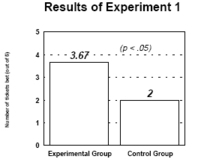On average, most gamblers experience net losses from their gambling activities. Several explanations have been posited to explain why gamblers continue to gamble despite an overall net loss. These explanations include cognitive processes that result in the gambler selectively remembering wins over losses, overestimation of the degree of control the gambler has over the outcome, and the “gambler’s fallacy” (the belief that after a run of losses, a win is overdue). Gibson and colleagues conducted a series of 3 experiments which supports another explanation: that “selective hypothesis testing” leads gamblers to overestimate the probability of a particular outcome and influences subsequent gambling activity. For example, focusing on the possibility that your home team will win a game leads to 1) overestimating the likelihood that your home team will win and 2) increasing your willingness to gamble. The first of the 3 experiments asked the experimental group to consider a randomly selected NBA team out of 4 contenders for the league championship and imagine a scenario in which that team would win; the control group members were asked to select a team, but not prompted to focus on that team. All participants selected a probability between 0 and 1 that their selected team would win the championship. In addition, participants were given 5 tickets and could choose to bet 0-5 of their tickets on one of the 4 teams. If the selected team won, they would get 4 additional tickets for each bet; it the team lost, they would forfeit their tickets. Participants then entered all of their remaining tickets into a drawing, with a prize of $25. The experiment found that the experimental group had higher probability estimations than were statistically possible, bet significantly more tickets than the control group (see chart), and bet proportionately more of their tickets on their “focal team” than would be expected by chance. These findings and the findings of the other 2 experiments support the idea that selective hypothesis testing may contribute to an increased willingness to gamble. Identifying the cognitive processes involved in gambling decisions is an important step in determining how individuals can avoid the adverse consequences of certain gambling decisions. These researchers suggest that one cognitive behavioral strategy is to teach gamblers perspective by training them to consider multiple potential outcomes prior to the bet, thereby reducing the likelihood that any single option will appear superior.
Source: Gibson, B., Sanbonmatsu, D.M., & Posavac, S.S. (1997). The effects of selective hypothesis testing on gambling. Journal of Experimental Psychology: Applied, 3(2), 126-142.
This public education project is funded, in part, by The Andrews Foundation.
This fax may be copied without permission. Please cite The WAGER as the source.
For more information contact the Massachusetts Council on Compulsive Gambling, 190 High Street, Suite 6, Boston, MA 02110, U.S. .





